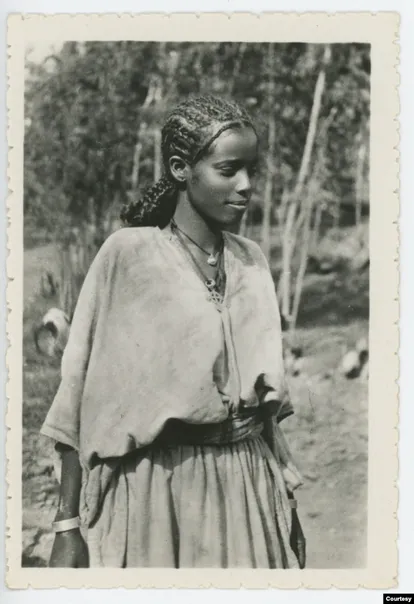Ethiopia was an empire, a nation proud of its history, and the only non-colonized African territory when this story began. Emperor Haile Selassie, also known as Ras Tafari, occupied the throne with all its paraphernalia and international projection when Mussolini decided to invade it in 1935 to the greater glory of his dictatorship. Today, Ethiopian author Maaza Mengiste has taken that dramatic backdrop to novel the fight of women warriors against Il Duce in
The King in the Shadow
(Gutenberg Galaxy), a breathtaking epic story in which there is no glamor that was worth it to be Booker Prize finalist in 2020.
Village girls, illiterate youths or prostituted girls fought against the invader while being victims of rape by their compatriots, who treated them as one more property among the scarce supplies they carried. While the fascists punished with mustard gas, artillery and merciless air power, the famished Ethiopian patriots fought without surrendering with their old rifles on their shoulders and scant homemade ammunition. There aren't many joys in
The Shadow King.
“The history of Ethiopia has told us that there were heroic, brave men who fought like David against Goliath until they expelled the Italian fascists, but all, both Ethiopian and Italian historians, had forgotten about women. There were thousands who fought with the same bravery ”, says Maaza Mengiste, 51, in a videoconference from New York. "His story is very unknown." One of those chroniclers was the great journalist Indro Montanelli, who precisely bought a 12-year-old girl to
marry her
while covering the conflict and who justified his actions because it was normal there. And that is the story that Maaza Mengiste transmits to us today.
Photograph of an Ethiopian woman in 1935 that is part of the collection compiled by Maaza Mengiste to document her novel. Editorial Galaxy GutenbergGalaxia Gutenberg
His own family life is embedded in that of his country, that former Abyssinian empire shaken today by wars like the one being waged these days by the Ethiopian Government and the rebels of the Tigray region. Born in Addis Ababa in 1971 and exiled since she was a child when the revolution came, she had always heard the stories of those who fought. And she decided to start a book that took her to Italy to investigate the matter in depth and whose development took two stages: five years to finish a first version focused on men, which she threw away when she realized the scope of the role of women; and another five to reach the version published today. “I was inspired by stories of men, legendary tales of bravery, great for my imagination, that had grown in my head since I was a child and,As a black girl in America, I believed they were very important to me. But as I was investigating I found another reality and I changed my story. My book questions that selective memory with which we have grown up ”, he relates.
Its main protagonist is Hirut, an orphan girl taken in by the man her own mother had adopted as a child and who will soon stop treating her as a sister to rape her at will. With a stark rawness, Mengiste builds a character that is as easy to hurt - for small, for a girl, for little - as it is difficult to knock down - for brave. Fighting, strong in her vulnerability and determined to defend herself, Hirut may lie under the body of the rapist warrior or suffer the lashes of his wife, but his mind will never submit. And it will generate conflict. "That was my great-grandmother, Getey, a small woman always ready to defend herself, who was not afraid of men and who faced all those who attacked her." Getey, as in her book with other protagonists, was forced to marry when she had not yet menstruated.And he also went to war.
A false king
This is a book to read with
Aida
's opera in the background, as Emperor Selassie does in the novel while the fascists invade his country, or even without it, because its pages may be enough to immerse us in the epic of a violent struggle in lands. African like the one in Verdi's work.
Mengiste admits that it served as background music for her - not for nothing is the story of an Ethiopian princess who messed up a good one in Egypt - and above all that it allowed her to give the structure its own rhythm: as in the opera, Characters enter, others leave, the choruses sing and there are repeated cadences with risks and feelings that cloud the plot.
One of those voices that enters and leaves with its own strength is that of an Italian photographer, Ettore, who documents with his camera the advances of his Army and the massacres against the population. Because the unredeemed resist, they create a false king to keep morale high when Selassie goes into exile in England (hence the title) and they suffer with dignity in concentration camps or in false prisons where Italians throw them off a cliff to their death. safe. But Ettore is not a simple journalist soldier without conflict, but a Jewish Italian who will soon begin to suffer the own repression of what he believed was his side. “When I began to investigate I found that many Jewish soldiers had to leave the Army when the Nazis won and that they were persecuted as new enemies.One day they were Italians among Ethiopians enemies and another day they were enemies of all, Italians and Ethiopians, ”says the author.
Somehow, it happened to the Jews like those Ethiopian women who, soldiers or not, were always women. “The big difference between them and them was that when a male soldier returned to a camp, he was still a soldier. When a female soldier returned, she stopped being a soldier and became a woman, ”says Mengiste. And that meant looking for sustenance, preparing it, distributing it, caring for the wounded, carrying bundles, mixing gunpowder and, among the dark bushes or the most inhospitable beds, suffering the rapes of the warlords, even if they were barely girls.
Maaza Mengiste feels American and also part of the Ethiopian diaspora, where her mother returned to live and where she maintains an abundant family.
With great pulse he has narrated the simplicity of a humble life that is not humble in feelings, in grudges, and in the crushed wounds of a tragedy into a tragedy.
"Hold her while she trembles to feel your own strength," was the father's advice to the rapist warrior when he was going to marry a girl.
A phrase not to forget.
If there is a stomach, you have to read it.









